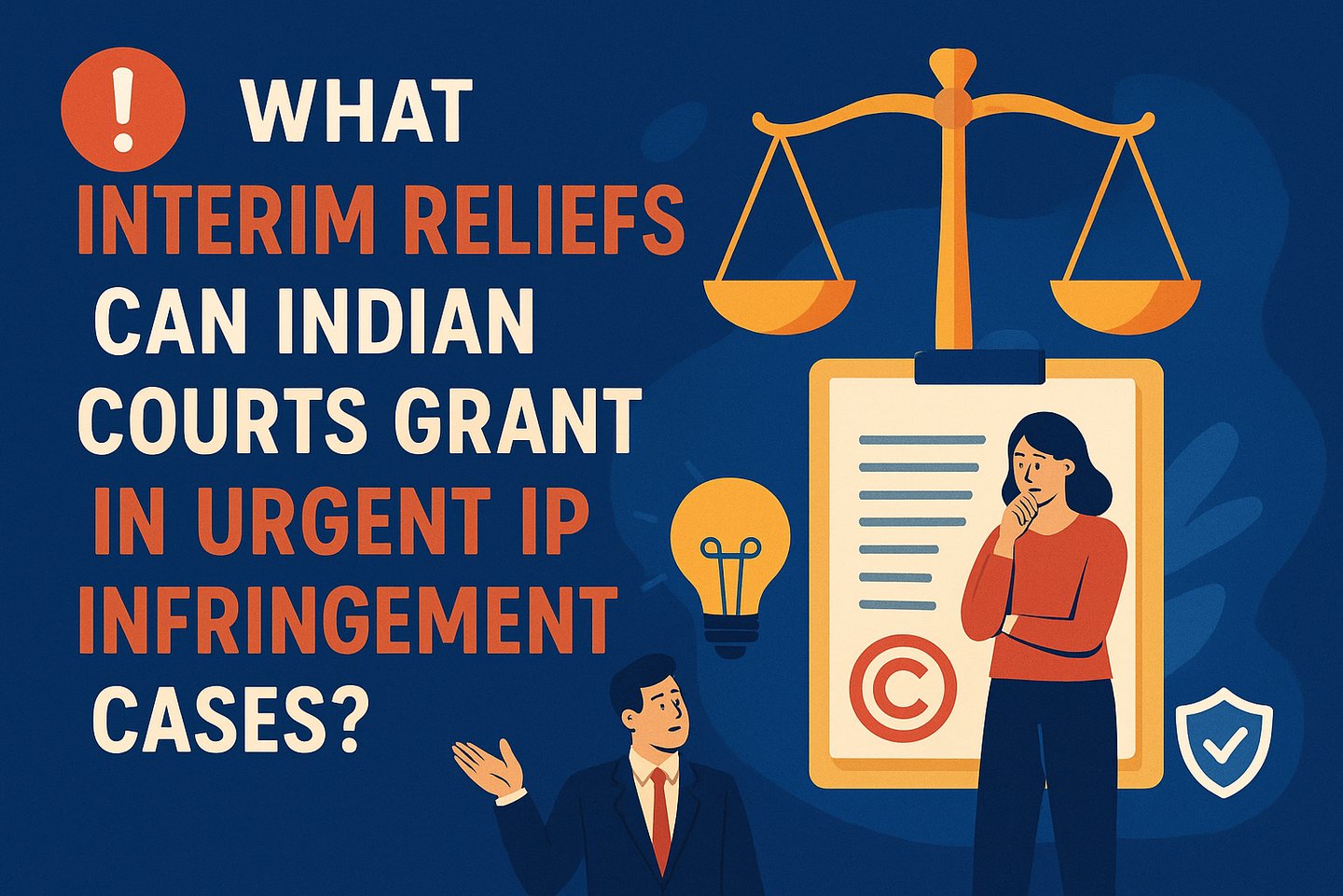What Interim Reliefs Can Indian Courts Grant in Urgent IP Infringement Cases?
This paper looks at the urgent interim reliefs that Indian courts issue in IP infringement cases. It covers temporary injunctions, Anton Piller orders, and John Doe orders. It also discusses the legal standards used and how courts weigh urgency, evidence preservation, and the protection of IP rights.
IPR
Rukaiya Neemuchwala
11/18/20253 min read


Introduction:
IP protection is essential to encourage innovation, creativity, and fair competition. However, the speed at which business is carried out these days makes it quite possible for infringement to result in considerable, often irreparable injury before a trial is finally completed. Indian courts answer this need for urgency with various types of interim relief that secure the rights of IP owners during the period of litigation. These include temporary injunctions, Anton Piller orders, John Doe orders, and evidence-preservation measures that prevent further misuse of the disputed IP so as not to render the final judgment meaningless. This paper looks at the nature, scope, and legal framework of these interim reliefs, as well as the principles guiding courts in granting them.
Need for Interim Relief in IP Disputes:
IP infringement cases often involve fast and irreversible harm, such as unauthorized copying, mass distribution, leaking of confidential information, or counterfeit sales. A full trial takes time, so interim reliefs provide urgent protection for the IP owner. Their purpose is to maintain the current situation, prevent further damage, and protect the value of the IP until the court makes a final decision.
Courts consider three important tests before granting any interim order:
1. Prima facie case—The plaintiff must show a credible case of infringement.
2. Balance of convenience—The harm to the plaintiff if relief is denied must outweigh the harm to the defendant if relief is granted.
3. Irreparable injury—The damage cannot be compensated adequately through money.
Temporary Injunctions:
a. Nature and Purpose
A temporary injunction is the most common type of interim remedy. It stops the defendant from continuing any infringing activities until the case is resolved.
b. Typical Uses
· Stopping the sale of counterfeit products
· Preventing the use of a deceptively similar trademark
· Restricting further distribution of pirated content
· Preventing the misuse of copyrighted software
c. Preventive and Mandatory Injunctions
Preventive injunctions stop the defendant from acting.
Mandatory injunctions require the defendant to take specific actions, such as removing infringing goods from shelves or taking down infringing posts from online platforms.
Anton Piller Orders (Search and Seizure):
Anton Piller orders are powerful search-and-seizure tools that are issued where there is a real possibility of the defendant destroying infringing goods or evidence.
Key Features:
· Granted ex parte: without hearing from the defendant.
· A commissioner appointed by the court enters the premises of the defendant.
· Documents, products, equipment, or digital files can be inspected or seized.
· These orders assist in securing key evidence.
These orders are issued by Indian courts in cases of software piracy, counterfeit manufacturing, and theft of trade secrets, where the evidence may disappear in a very short time.
John Doe / Ashok Kumar Orders:
John Doe orders let courts restrain unknown or unnamed defendants. They are very useful when infringement is widespread or done by individuals whose identities are still unknown.
Typical Situations:
· Illegal streaming and movie piracy
· Large-scale copyright sharing on online platforms
· Counterfeit goods sold through unknown or untraceable retailers
Once granted, the order can be enforced against anyone found engaging in the infringing act, even if they were not originally named in the lawsuit.
Appointment of Local Commissioners:
Under the Civil Procedure Code and IP statutes, courts frequently appoint local commissioners to:
Inspect infringing premises
Take photographs or videos
Prepare inventories
Seal infringing materials
Supervise compliance with court orders
These commissioners help establish factual evidence and ensure transparency in urgent cases.
Urgency and Ex Parte Relief:
In severe cases, where delays may undermine justice, courts issue ex parte interim orders without informing the defendant. This often occurs when:
- Infringement is happening on a large scale
- Evidence may be destroyed
- The defendant cannot be found
- The plaintiff faces immediate financial or reputational harm
Ex parte relief provides the plaintiff with immediate protection before the defendant has a chance to respond.
Blocking Orders for Online Infringement:
With the rise of digital piracy, Indian courts now grant website blocking orders, directing intermediaries and ISPs to:
Disable access to infringing websites
Remove specific URLs hosting pirated content
Restrict sharing of copyrighted content online
Such orders are heavily used in film, music, OTT, and software piracy cases.
Conclusion:
Interim reliefs are vital for enforcing intellectual property rights in India. IP infringement can cause quick and irreversible damage. To address this, Indian courts have created a strong system of urgent remedies that protect rights even before a final decision is made. Temporary injunctions, Anton Piller orders, John Doe orders, Mareva injunctions, and other preservation measures work together to create a framework that safeguards both the subject of the dispute and the evidence needed for a fair trial. The courts consistently stress principles such as prima facie case, balance of convenience, and irreparable injury to ensure fairness when granting these extraordinary powers.
In recent years, the judiciary has updated traditional principles to meet modern challenges like digital piracy, online counterfeiting, and rapidly changing technology markets. Courts are willing to grant ex parte relief, appoint commissioners, and issue blocking orders, showing a proactive approach to prevent injustice early on. The strength of interim reliefs comes from their ability to protect IP rights, discourage potential infringers, and uphold trust in the legal system as a tool for defending innovation and creativity. As business practices change, the responsiveness of Indian courts will be essential in keeping intellectual property law relevant and able to address urgent enforcement needs.
